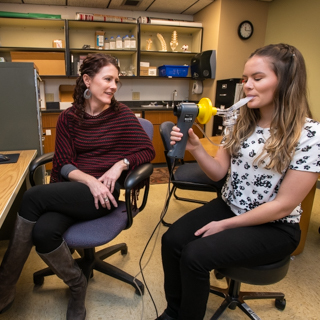MS Graduate Application Process
Application Deadline & Status
- Application submissions must have a verified status by January 15th for fall enrollment only. Late applications will not be considered.
- Applicants must apply to CSDCAS (Communication Science and Disorders Centralized Application Service); detailed application completion and submission instructions are available on the CSDCAS website.
-
Applicants will be notified about application status via email; those meeting CSD candidacy requirements will then be instructed to submit an application to the University of Montana Graduate School upon acceptance.
Program Requirements for Admission
- A bachelor's degree in Communicative Sciences and Disorders (CSD) or Speech-Language Pathology OR bachelor's degree in a related field and completion of a CSD leveling program. Completion of prerequisite courses and/or course equivalences must be completed within the past eight years, and with a grade of a B- or above.
- Minimum GPA of 3.0 for all CSD courses.
- Participation in the UM CSD graduate program requires a criminal background check, immunizations, and completion of 25 ASHA-certified guided observation hours along with a number of other items. Detailed information about clinical practicum requirements is available on the CSD master's program website and clinical education website.
Required Application Materials
The School of Speech, Language, Hearing & Occupational Sciences (SLHOS) requires all application materials be submitted directly to CSDCAS. For specific submission instructions regarding the following items, please refer to the CSDCAS website.
- Letters of recommendation: Three (3) letters of recommendation submitted, directly to CSDCAS, by persons who have direct knowledge of the applicant's character and abilities. At least one letter should be from a current or former professor and address the academic qualities of the applicant. Other letters may be from:
- current or former employers/supervisors
- someone who knows the applicant professionally who can address the applicant's qualifications, experience, and drive to become a speech-language pathologist
- someone who can address the applicant's personal character qualities necessary for professional practice in speech-language pathology
- Resume: Information from a current resume, including education, paid experience, volunteer experience, community involvement and other related activities will be entered into your CSDCAS application under the "Supporting Information" section. Please note: no PDF of a current resume is required for this year's application.
- Transcripts: Official undergraduate transcripts from all universities and college attended submitted directly to CSDCAS.
- Essay: Two-page typed, double-spaced using 12-point type size in the CSDCAS application
Supplemental Application Questions
- Several short-answer information-gathering supplemental questions are included as part of the CSDCAS application.
International Students
- International applicants follow the procedures described above. In addition, see the information in the International Admission section on University of Montana Graduate School website.
- Non-native English Speakers- Test of English as a Foreign Language (TOEFL) institution code is C122.
Financial Assistance
For information about financial assistance, see the Financial Information section on the University of Montana Graduate School website.
Grad Student Scholarships and Traineeship Opportunities
See 2024-2025 MS SLP Graduate Student Scholarship Opportunities page for the latest in scholarships and traineeships available to current and incoming MS SLP students.
Contact Us
Contact the School of Speech, Language, Hearing & Occupational Sciences at amanda.jackson@mso.umt.edu or 406.243.2363 if you have any questions.
Clery Act
In 1998, Congress passed amendments to the Crime Awareness and Campus Security Act of 1990, which had amended the earlier Higher Education Act of 1965 (HEA), renaming the law to the Jeanne Clery Disclosure of Campus Security Policy and Campus Crime Statistics Act, also known as the Clery Act.
The purpose of the Clery Act is to provide current and prospective students and employees with accurate and important information about crimes and campus safety so they can make informed decisions. The U.S. Department of Education electronically publishes UM data, along with comparable information from other colleges and universities.
